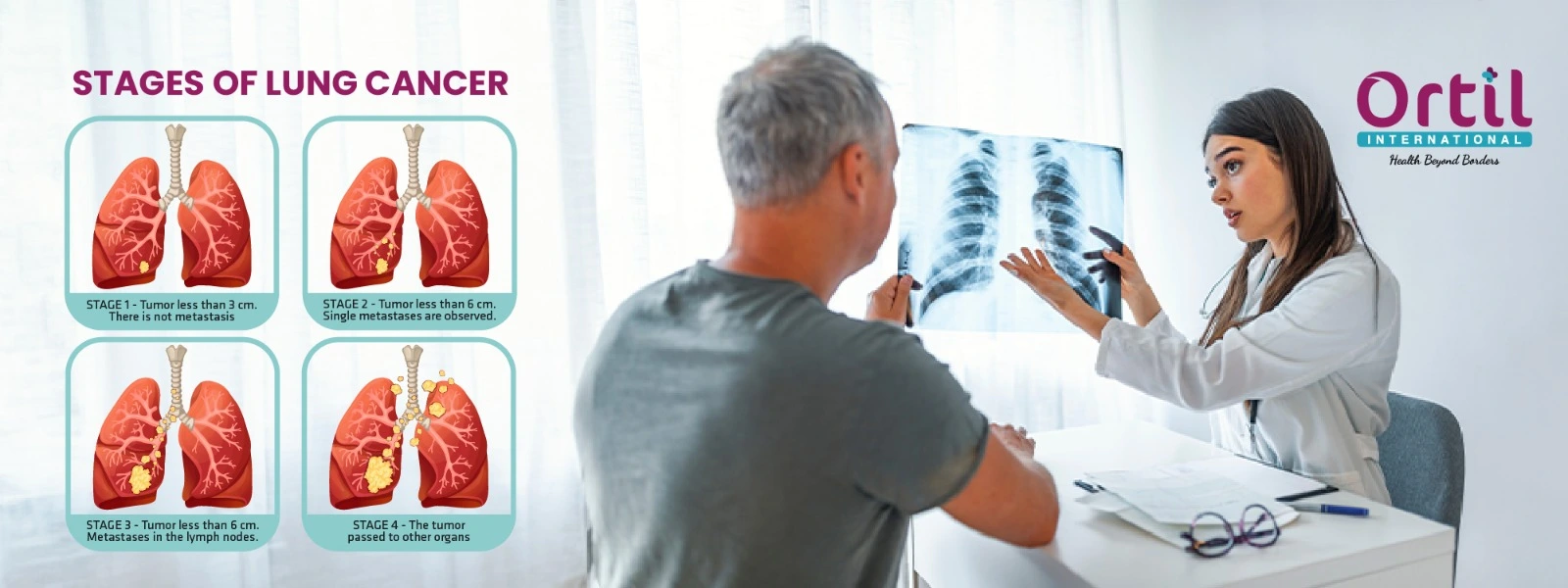What is Lung Cancer and How is it Treated?

When the cells in the tissues of lungs start dividing uncontrollably and form the tumor in the lungs, it is termed as Lung Cancer. These abnormal cells form tumors and can interfere with the normal functioning of the lung which affects their ability to provide oxygen to the body.
Lung cancer can be primary which is formed in the lungs. But sometimes, the cancer cells spread from other parts of the body to form a tumor in the lungs, which is termed as secondary lung cancer.
What are the Types of Lung Cancer?
There are many types of lung cancer but mainly lung cancer is divided into two types. These are:
- Non-small cell lung cancer.
- Small cell lung cancer.
Non-Small Cell Lung Cancer (NSCLC)
Non-small lung cancer is most common type of lung cancer. They form 80-85% of all the cancers that developed in the lungs. The non-small cell lung cancer is further divided into subtypes. These are:
Adenocarcinoma: This type of lung cancer occurs in the cells which secrete some substance like mucus. This type of lung cancer is most common in women and also present in both smokers and non-smokers.
Squamous cell carcinoma: this type of lung cancer forms in the cells that are present in the inner layers of lungs. Squamous cell carcinoma is often present in smokers.
Large cell carcinoma: large cell carcinoma is found in any type of the cell and at any part of the lungs. These cancers grow rapidly and are often very hard to treat.
Small Cell Lung Cancer (SCLC)
Small cell lung cancer forms 15-20% of all the lung cancer. They show rapid growth of the abnormal cells. Small cell lung cancer is very difficult to diagnose. By the time it is found, it already has spread to other parts of the lungs and sometimes other organs. This type of lung cancer can cause many complications in treatment.
Other Types of Lung Cancer
Along with main types of Lung Cancer, there are some other types of lung cancer that are usually rare to develop. These are:
Lung Carcinoid Tumors: these tumor cells usually grow very slowly. They are difficult to find and they may present in less than 5% of lung cancer.
Metastatic cancer: the cancer forms in the other organs can spread to the lungs which we called metastatic cancer. For example, if a person is suffering from a brain tumor, the tumor cells in the brain can travel to the lungs to form a new tumor.
Adenoid cystic carcinomas, Lymphomas, and Sarcomas, hamartomas: these types of lung cancers are very rare. They show different kinds of nature for which reason doctors use very different types of treatment protocols to treat them.
What Causes Lung Cancer?
There may be different causes that can develop lung cancer. Some of these include:
Smoking
Smoking is the leading cause of lung cancer. Almost all persons who are diagnosed with lung cancer have a history of smoking but it is not necessary that all persons who smoke will get lung cancer. But still Smoking causes 80% of deaths due to lung cancer.
Exposure to Harmful Chemicals
People who have the type of occupation in which they are exposed to some chemicals like diesel, asbestos can develop lung cancer. So diesel and asbestos and other harmful substances cause lung cancer. Exposure to passive smoking can also cause lung cancer.
Gene Changes
Scientists discover that many changes in the DNA and their genes can cause lung cancer. Whenever the DNA loses control over the genes that multiply the cells, it can cause rapid uncontrolled division of cells and form cancer. When DNA in the cells of the lung changes, it can cause lung cancer.
How is Lung Cancer Diagnosed?
Lung cancer can be diagnosed in many ways. Here are some of the options that can diagnose lung cancer.
Medical history and examination: doctors examine you physically and correlate the findings with the medical history in the out-patient department during your visit to your physician.
Imaging scans: if your doctor suspects any abnormality in your lungs, then they may perform certain tests on you which include X-rays, CT scan, MRI, PET Scan and Bone scan. These tests use x-rays, sound waves, radioactive substances and magnetic waves to create pictures of the inside of your body.
Biopsy: doctors perform the biopsy in which they extract some cells in the tissues of lungs and check them under the laboratory to find any abnormality. This test confirmed the presence of tumor cells in the tissues and is a very authentic way to diagnose lung cancer.
Sputum test: the test is performed to check any abnormal tumor cells present in the mucus which you have coughed. Sputum tests usually require 3 samples to confirm the presence of tumor cells in the lungs or its airways.
What Tests will be done to Diagnose Lung Cancer?
When diagnosing lung cancer, several tests may be performed to confirm the presence of cancer, its type, and stage at which it is present. The specific tests recommendations may vary with each individual medical history and physical examination. Here are some common tests used in the diagnosis of lung cancer:
Pulmonary function tests: that measure the lung’s capacity and pattern of breathing.
Bronchoscopy: that examine the tissue with a camera
Biopsy: that confirm the presence of tumor cells in the tissue sample
Sputum cytology: that finds the cancer cell in the sputum
Thoracentesis: If there is fluid around the lungs, a needle may be inserted to remove some fluid for testing.
Imaging tests: chest X-ray, PET scan, MRI are performed to find the extent of tumor mass present in the lungs.
How is Lung Cancer Treated?
Lung cancer can be treated like any other cancer present in the body. There are several treatment options to treat lung cancer. Each treatment option has its own pros and cons. Your doctor may suggest a specific type of treatment plan according to your medical history and stage of cancer. Sometimes your doctor only treats lung cancer to lower its symptoms and improve the quality of life. Some of the treatment options available are:
- Chemotherapy
- Immunotherapy
- Radiation Therapy
- Surgery
- Palliative treatment
What Medications are used in Lung Cancer?
Chemotherapy Medications for Lung Cancer:
Chemotherapy drugs are usually given in the combinations for maximum effect and for the maintenance of drugs. These are:
- Cisplatin and etoposide
- Carboplatin and etoposide
- Cisplatin and irinotecan
- Carboplatin and irinotecan
Immunotherapy Medications for Lung Cancer
These drugs prepare the immune system to find the tumor cells that form in the lungs. These medications are:
- Atezolizumab
- durvalumab
- Nivolumab
- pembrolizumab
- cemiplimab
Target Drug Therapy for Lung Cancer
They limit the growth of tumor cells by blocking the proteins that are essential for the growth of cancer cells. Some of these are:
How to Prevent Lung Cancer?
Lung cancer can be prevented if you follow these:
- Avoid exposure of asbestos and diesel
- You shouldn’t be involving in tobacco smoking
- You should expose yourself to cancer-causing agents with maximum protection
- You should start eating a healthy diet to prevent any type of cancer including lung cancer.
- Maintain an active lifestyle and do exercise.
FAQ's for Lung Cancer
What is the main treatment for lung cancer?
Chemotherapy and radiotherapy are used mainly to treat lung cancer.
What are the 1st signs of lung cancer?
Difficulty in breathing and coughing with sputum can be the early sign of Lung cancer.
What is the first treatment for lung cancer?
The treatment is decided according to the condition of the patient. So the first treatment can be chemotherapy for some patients and some may require surgery.
Can you survive from lung cancer?
If the lung cancer is diagnosed at early stages, or managed properly by the expert oncologists, it is possible to survive.
What is the best test for lung cancer?
Biopsy gives the confirmed diagnosis for lung cancer.
Can blood tests detect lung cancer?
Blood tests are not typically used to detect lung cancer. Blood tests are often used to assess general health or evaluate the function of lungs affected by cancer.














